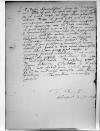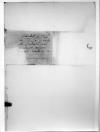List #96
Ioannes SECUNDUS do Ioannes DANTISCUSMechelen, [1532]-02-24
Rękopiśmienne podstawy źródłowe:
| ||||
Tekst + aparat krytyczny + komentarz Zwykły tekst Tekst + komentarz Tekst + aparat krytyczny
R paper damaged⌈[R]R paper damaged⌉everendissimo in Christo pat paper damaged⌈[pat]pat paper damaged⌉ri, domino
Salutem plurimam, praesul observandissime.
Accepi per cursorem tuum cf.
Scripsi de negotiis litium illarum bis, itaque nunc nihil addo.
Commendat se tibi
Tuae Reverendissimae Paternitatis deditissimus


 AAWO, AB, D. 102, f. 197v
AAWO, AB, D. 102, f. 197v